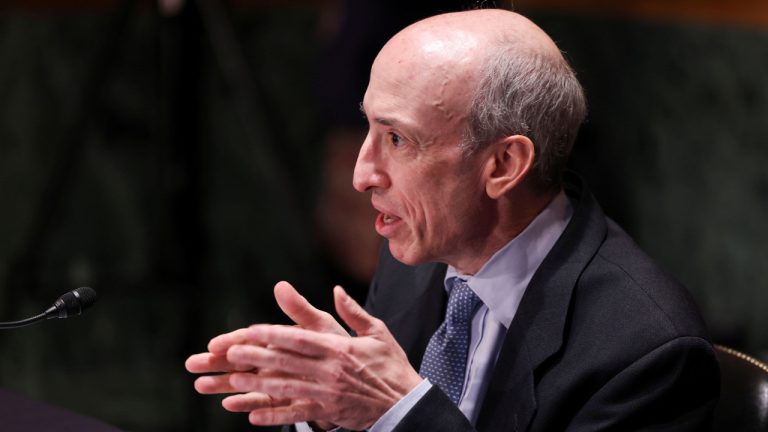
Bitcoin, the original blockchain, struggles to gain traction among blockchain advocates; an opinion from one of Europe's largest blockchain conferences.
Bitcoin (BTC) popularised the term blockchain. Blockchains, or “decentralized and distributed digital ledgers used to record transactions across a network of computers,” have been around for over thirty years, the household name for a blockchain is Bitcoin.
That’s despite the fact that the Genesis block was mined well over 14 years ago when George W. Bush was president and “I Gotta Feeling” by Black Eyed Peas topped the charts–Bitcoin is still top of the blocks.
It’s to be expected, then, that most blockchain advocates would have used, understood or a the very least experimented with Bitcoin.
Nope. Not so.

Here’s an example. While MC’ing at the European Blockchain Conference in February, I asked the audience for a show of hands. I inquired of the circa 250 blockchain believers sitting in front of me:
"Who here has used Bitcoin?"
Maybe 20 audience hands shot up. “Okay. Keep your hand up if you’ve used Bitcoin’s Lightning Network,” I said. The Lightning Network or (LN) is the payments network built on top of Bitcoin which allows near-instant, near-free transactions. Over half those hands went down.
One data sample is insufficient. So, the following day I quizzed the audience on stage. I was surprised to receive the same result. Four-fifths of the blockchain conference audience had never used Bitcoin.
Why is that? Why is it that so few people have touched arguably the only blockchain that solves what is known as the “scalability trilemma;” that of decentralization, security and scalability?
The Bitcoin blockchain, or timechain as Satoshi Nakamoto called it in the white paper, is still relatively small. Anyone with an old laptop can download the entirety of all transactions in order to run a node; the network can scale to reach millions and soon billions of people with layers, while the Bitcoin blockchain has never been hacked. And yet at the blockchain conference, very few attendees run nodes or have transacted on Bitcoin.
However, there are not enough data points to yet form this conclusion. I wanted to quiz individuals across the conference if they were blockchainers or Bitcoiners–and if so, why is that the case?
I quizzed conference-goers about a simple question. I asked around 15 conference goers to choose Web3 or Web5, and only one person of the fifteen chose Web5. Ironically, the sole Web5 proponent in the interview is Bitcoiner Antonia Roupell, whose job title is “Web3 lead” for Save the Children.
If @JoeNakamoto happened to give you one #Bitcoin at the @EBlockchainCon, what would you do with it? pic.twitter.com/tV3hdEIA0n
— Cointelegraph (@Cointelegraph) February 20, 2023
Most respondents looked confused when presented with the choice of webs. “What is Web5?” They queried.
Web3 is a world of reportedly decentralized blockchains in which tokens (and token sales) drive the economy forward; Web5 is the decentralized internet built on Bitcoin. Naturally, Bitcoin maximalist Jack Dorsey champions Web5.
Dorsey explained in December 2021 that Web5 will allow true ownership of identity and data, unlike Web3. Dorsey explains that “Web3" has the “Same corporate incentives [as Twitter] but hides it under "decentralization.”
The Twitter founder reckons Web3 will never achieve true decentralization as underneath the marketing spiel and tokenomics it’s the venture capitalists and limited Partners who own the blockchains and the data underpinning the systems.
Web5 already boasts social media applications such as Zion in which users can easily send Bitcoin to one another and own their data, built atop one decentralized blockchain and. Which blockchain? You guessed it, Bitcoin.

Web3 has existed since Ethereum coder Gavin Wood coined the term in 2014 and thus has more time on its side. Plus it’s a catchy, catch-all term that is often used interchangeably with blockchain, crypto and metaverse. It’s hard to define, underline or frame without referring to financially lucrative projects.
It finally struck me that the focus of most attendees at the European Blockchain Convention was business over Bitcoin. Or to put it another way–and to attempt to be a little less naive–the attendees wanted to make money over work towards a new monetary policy.

I had the same experience when discussing Nostr, which stands for Notes and Other Stuff Transmitted by Relays. The relatively new, decentralized network enables private messaging and uncensorable communication–among other projects.
One of the applications of Nostr, called iPhone app Damus, helped Nostr reach nearly half a million daily users in mid-February. User count multiplied by 5 since its listing on the Apple iOS store and the protocol is full of Bitcoin advocates.
I asked conference attendees for their public key so I could follow them on Nostr. I was met with bemused looks. The blockchain believers and champions of decentralized protocols had not tested nor heard of Damus.

Do you want one more example?
An employee at a popular Bitcoin company–who I won’t dox in this opinion piece–approached me during the conference. “I saw you sending sats to people on stage. You sound like a [Bitcoin] maxi,” he joked.
“Guilty, officer” I joked. I only hold Bitcoin and am passionate about bringing Bitcoin to the world, especially those living in financially kneecapped countries.
“You would probably recognize the company I represent then. I work for Blockstream.”
Of course! I told him. I actually played Jenga in the park with Blockstream’s CEO, Adam Back, recently. We immediately bonded.
Related: Regulation stole the show at Barcelona’s European Blockchain Convention
The Blockstream employee confided in me that not a single conferencegoer had clocked his employer. Blockstream is a well-known Bitcoin companies. Blockstream pioneers lightning adoption, side chains, affordable hardware wallets and liquid, while Back was one of the few names mentioned in the Bitcoin white paper published in 2008.
He shared his surprise with me, but it was 5pm on the last day of the conference–by this point I understood. “It’s a Bitcoin company, mate” I explained. And after all, “Bitcoin and blockchain don’t really mix.” Bitcoin has a marketing problem, I said.
This article is for general information purposes and is not intended to be and should not be taken as legal or investment advice. The views, thoughts and opinions expressed here are the author’s alone and do not necessarily reflect or represent the views and opinions of Cointelegraph.







